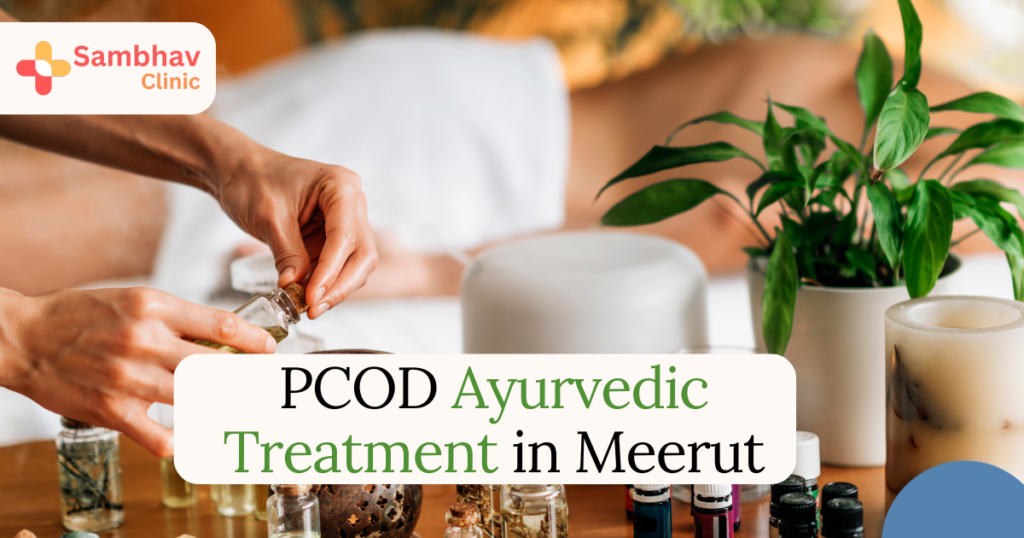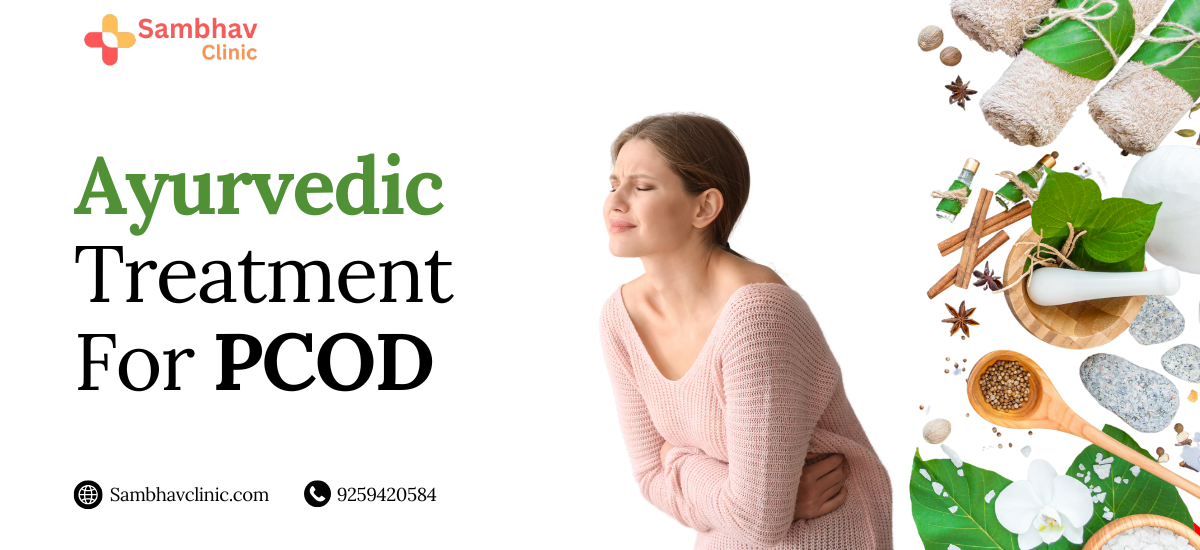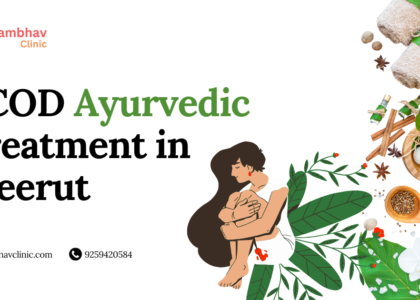Introduction
Polycyclic Ovarian Disease (PCOD) commonly referred to as Polycyclic Ovary Syndrome (PCOS) is a prevalent hormonal disorder. It is experienced by millions of women especially those at reproductive age. It is characterized by an irregular monthly cycle, small cysts on the ovaries and overgrowing of hair. You may also experience acne, weight gain as well as difficulty in getting pregnant. There is an upsurge in the number of women diagnosed with PCOD in India. This increase has been caused by poor lifestyles, unbalanced diets, and overstrained people.
This has increased the fame of PCOD to be treated by use of Ayurvedic drugs. It aims at addressing the underlying causes by equalizing body energies.
PCOD Ayurvedic Treatment in Meerut is a natural and unquestioned method to assist women. It emphasizes on herbal medicine and individual treatment. This therapy balances the hormones and makes one feel good and there are no side effects.
Ayurvedic view on PCOD
Ayurveda says a healthy lifestyle keeps three energies in balance. We call these energies doshas: Vata, Pitta, and Kapha. When these doshas get perturbed, they may lead to disease. In PCOD, a Kapha imbalance is usually associated with this. This can cause a slow metabolism, weight gain, hormonal issues, and ovarian cysts.
An unbalanced Kapha causes an excess of fluid, mucus, and fat. This buildup may form cysts. Menstrual cycles may become irregular in the case of the imbalance of Vata. A disturbed Pitta can cause inflammation, acne, and mood swings.
The other important concept is Ama. It is the accumulation of poisons that are a result of poor digestion and poor lifestyles. Ama builds up in the body and blocks natural pathways when the digestive fire (Agni) weakens. This blockage might interfere with modes of reproduction and hormones.
Ayurveda emphasizes the strong link between the mind and body. Emotional stress may worsen physical symptoms. Mental well-being is key for the effective management of PCOD. Knowing these principles helps us create treatment plans. They restore balance and improve our health.
Chronic stress, emotional issues, and mental fatigue can disrupt hormonal balance. This would aggravate the PCOD symptoms. The aims of Ayurvedic treatment for PCOD are to equalize doshas. It cleanses the body and improves physical and mental health.
PCOD causes and symptoms in Ayurveda
Ayurveda sees lifestyle choices as the main cause of PCOD. These choices lead to dosha imbalances, particularly in Kapha. Lack of exercise, overeating, stress, and insufficient sleep weaken your digestive fire (Agni). Toxins (Ama) also build up, disrupting hormones and affecting ovarian function.
Symptoms of PCOD depend on the dosha involved. An imbalanced Kapha may cause weight gain, fatigue, and irregular periods. , a Pitta imbalance can lead to acne, inflammation, and irritability. Vata issues may result in anxiety, bloating, and severe menstrual irregularities.
Ayurveda stresses early detection through dosha assessment. I can make a personal treatment plan by knowing my body type (Prakriti) and any doshic imbalances. Early Ayurvedic management of PCOD helps prevent long-term effects and supports lasting recovery.
Ayurveda Diagnosis and Personalized Care
Ayurveda treats PCOD with a thorough diagnosis. First, practitioners assess symptoms and lifestyle. They look at diet, stress, and health. This helps them understand each person’s unique situation.
Next, we create tailored treatments. These may include herbal remedies, dietary changes, and yoga practices. The goal is to restore balance in the body.
Lifestyle adjustments are key. Practitioners often recommend stress management techniques, like meditation. This supports emotional well-being.
Regular follow-ups help track progress. We can make adjustments to ensure effective care. The focus is on a holistic approach, treating both symptoms and the root cause.
Ayurveda offers a personalized plan. This helps people manage PCOD better and improve their quality of life. The aim is to empower each person on their wellness journey.
This step is crucial. Practitioners look at your symptoms, health history, and lifestyle. They also consider your body type or dosha.
After diagnosing, the practitioner creates a personalized care plan. This plan may include herbal remedies, dietary changes, and yoga. Each component aims to restore balance in your body.
For example, herbs like spearmint and ashwagandha are often used. They help regulate hormones and reduce stress.
Diet is also key. A balanced diet can improve symptoms. Practitioners may recommend foods that balance your dosha.
Also, yoga plays a vital role. Specific poses can enhance reproductive health and reduce stress.
The goal is to treat the root cause of PCOD, not the symptoms. This holistic approach helps promote long-term well-being.
Unlike conventional medicine, Ayurveda does not use a one-size-fits-all method. It looks at each patient’s unique Prakriti (body type). It also considers the dosha imbalance—vata, pitta, or kapha—that causes the issue.
Diagnosis involves traditional methods such as:
- Nadi Pariksha (pulse reading)
- Tongue examination
- Tracking menstrual cycles
- Assessing lifestyle factors
This assessment helps Ayurvedic doctors identify the root cause of PCOD.
Once the team finds the imbalance, they create a personalized treatment plan. This plan may include herbal remedies, detox therapies such as Panchakarma, diet changes, and lifestyle adjustments. The goal is to manage symptoms, restore hormonal balance, and improve reproductive health. We also want to prevent relapse. In Meerut, Ayurvedic treatment for PCOD tailors care to match proven healing methods.

Herbs in Ayurveda for treating PCOD.
Ayurveda provides various herbal treatments. These aim to tackle the causes of PCOD and help balance hormones. Practitioners choose these herbs based on each person’s dosha imbalance and health status.
Here are some herbs that are frequently utilized in Ayurvedic treatment for PCOD:
- Ashoka (Saraca indica): This herb regulates the menstrual cycle and supports uterine health.
- Shatavari (Asparagus racemosus): A powerful adaptogen, it balances female hormones and enhances fertility.
- Lodhra (Symplocos racemosa): It reduces heavy bleeding, decreases swelling, and strengthens reproductive organs.
- Triphala: This gentle detoxifier improves digestion and eliminates ama (toxins) from the body.
- Guggulu (Commiphora mukul) helps reduce inflammation and fat. It treats cysts and supports weight management.
Patients can use these herbs in different forms: powders, tablets, decoctions, or oils. The choice depends on their constitution and condition. They help restore ovulation and regulate menstrual cycles. This works best with a balanced diet and detox treatments.
Many women in Meerut prefer Ayurvedic treatment for PCOD. They seek these effective herbal therapies. Professionals provide these therapies, ensuring safe and natural results.
Panchakarma Therapy: Detoxifying
Panchakarma is a key part of Ayurvedic treatment, especially for conditions like PCOD. This detox process removes toxins (Ama), balances doshas, and revitalizes the reproductive system. Panchakarma is effective for clearing the body and harmonizing hormones in PCOD patients.
Key Panchakarma treatments for PCOD include:
- Vamana, or therapeutic emesis, helps clear out excess Kapha and toxins from the upper digestive tract.
- Virechana (purgation treatment) helps clear Pitta and toxins from the liver and intestines. This process improves hormonal metabolism.
- Basti (medicated enema): It supports the ovaries and uterus. It balances Vata dosha and helps to keep menstrual cycles regular.
Trained Ayurvedic doctors administer these treatments. They often include dietary changes and rest. Women seeking PCOD Ayurvedic treatment in Meerut can access customized Panchakarma therapies. This holistic approach ensures detoxification, hormone balance, and supports long-term reproductive health.
Ayurveda Diet and Life Changes
Diet and lifestyle are key factors in the success of Ayurvedic treatment for PCOD. As Ayurveda argues, food is more than a source of nourishment; it also serves as medicine. Diet Intake: To lower cysts and improve digestion, eat a balanced diet that calms Kapha.
You should consider the following dietary changes:
Consuming light, warm, and fresh foods.
Include healthy oils like ghee. Also, add carrots, cabbage, cauliflower, roselle, green chilies, lentils, and whole grains.
Using spices like turmeric, cinnamon, fenugreek, and ginger helps boost digestion and metabolism.
Avoid cold, oily, sugary, and processed foods. These irritate Kapha and lead to āma.
Herbal teas like cumin, coriander, and fennel help with digestion and detox.
Lifestyle modifications are also invaluable besides eating. Ayurveda suggests adherence to the daily routine (Dinacharya), which involves:
Rising early to perform yoga and pranayama normalizes the hormones.
Dealing with stress through meditation and mindfulness practices.
Getting a good night’s sleep and restricting screen time.
These healthy habits improve insulin levels, regulate menstrual cycles, and enhance emotional well-being. Clinics in Meerut offer Ayurvedic treatment for PCOD. They create personalized diet and lifestyle plans. This helps patients succeed in the long term.
Advantages of Ayurvedic Treatment for PCOD in Meerut
Meerut is emerging as a hub for effective Ayurvedic treatment for PCOD. Women can access traditional healing methods supported by modern techniques. Here are some benefits of choosing Ayurvedic treatment in Meerut.
First, experienced Ayurvedic doctors specialize in women’s health and hormonal issues. They personalize their approach. They focus on individual dosha imbalances instead of a one-size-fits-all method. Many clinics offer Panchakarma detox treatments. They also provide herbal remedies and custom dietary plans, all in one place.
Healthcare in Meerut is usually cheaper and easier to access than in bigger cities. Mixing modern diagnostic tools with ancient Ayurvedic wisdom improves management and results.
Ayurvedic treatment for PCOD in Meerut attracts women from other areas. They find it safe, free from side effects, and sustainable for long-term healing.
Actual Life Case Studies or Testimonials
Ayurvedic treatment for PCOD has helped many women feel better, especially in Meerut. For instance, a 28-year-old woman struggled with irregular periods, acne, and weight gain. After a tailored Ayurvedic therapy that included Panchakarma, herbal supplements, and diet changes, she noticed progress. In six months, her periods were regular, her skin improved, and her energy increased.
These success stories highlight the power of natural healing with professional guidance. They inspire others to explore Ayurveda as a safe way to manage PCOD.
Ayurveda focuses on treating the root cause of PCOD, not the symptoms. Its approach restores dosha balance, boosts digestion (Agni), and removes toxins (Ama). Ayurvedic treatment helps with natural ovulation, regular periods, and fertility. It does this without the side effects of hormonal pills or quick fixes.
This method emphasizes personal care, herbal remedies, and lifestyle changes for lasting support. PCOD Ayurvedic treatment in Meerut is a great option. It offers holistic and sustainable ways to manage hormonal disorders.
Conclusion
PCOD is a complex hormonal issue that needs more than a quick fix; it requires a lasting solution. Ayurvedic treatment tackles PCOD by balancing doshas. It detoxifies the body and supports a healthy lifestyle. Ayurveda restores hormonal balance and boosts well-being. It uses a mix of herbs, Panchakarma treatments, and personalized advice.
More women are looking for natural and lasting solutions for PCOD. They are turning to Ayurvedic treatment in Meerut. Skilled professionals use ancient wisdom to provide personalized care. Ayurveda brings real healing. It helps with physical health and also supports emotional and hormonal well-being.


